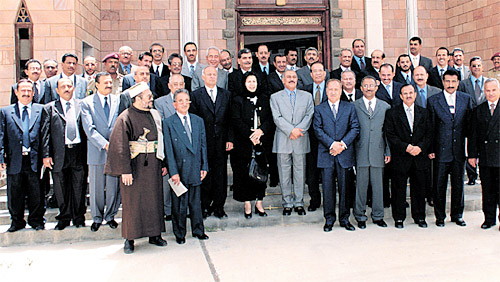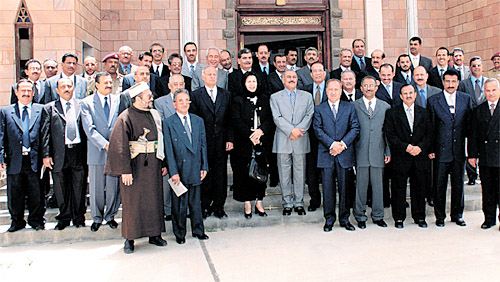
MEETING THE CHALLENGE [Archives:2001/15/Front Page]
April 9 2001

The new government of Abdulqader Ba-Jamal was sworn in Saturday before President Ali Abdullah Saleh. The president chaired the first meeting of the new government. He addressed the meeting, pointing out the responsibilities to be undertaken and target to be achieved by each and every minister. He focused on their duties to enact the law, curb corruption and fulfill the peoples’ aspirations in education, development, industry, as well as improve services and living conditions for the nation as a whole.
He told the new ministers “you have to have new approaches and be serious in your work while showing no leniency”. He said the new government should continue implementing the economic, administrative, security and judicial reforms , adding ” our new battle is development for which we should exert all efforts.”
He further told the ministers that the coming two years, their term in office, are an acid test for those who will work hard to prove their credibility. He highlighted the role of the ministry of finance in identifying efficient people through its continuous evaluation of their work.
The President said that the new government now prioritizes technical education and vocational training as the backbone of development and a means to minimize the unemployment rate among young people. For galvanizing industry, he stressed the importance of strategic industries, building industrial complexes areas and moving away all industrial establishments outside of cities. Pointing out the necessity of observing quality standardization and specification so as to protect the consumer. He asked the minister of education to integrate the educational system in Yemen, hinting at the scholastic institutes being sponsored and influenced by the Islah Party. He also talked about the necessity of taking care of the cultural heritage of Yemen and paying more attention to tourism as a main resource of development.
The president said the ministry of legal affairs should reconsider the bye-law of political parties.” The past experience showed how necessary it is for the Supreme Election Committee to be independent, neutral, and non-partisan,” the president said. He added that SEC should be non-partisan, pointing out that it should be run by independent people. He said the cabinet should give the local councils a chance to work and carry out decentralization and that the ministry of local administration should divide Yemen into 301 districts to meet the number of election constituencies.
With regard to security, the President pointed out that the ministries of Interior and Justice should cooperate and work together to maintain security and fight crime. He asked the minister of Interior to abolish and withdraw all licenses concerning the carrying of weapons.
Concerning human rights, the President said that the choice of Dr. Wahibah Far’e as a minister of human rights spells out the significant role of women in society and how important the human rights issue is in Yemen. He said Mrs. Far’e would receive full support from him and the PM.
On his part, PM Ba-Jamal said his government will enhance security and stability, and follow up the implementation of comprehensive reforms, mainly judicial, making Yemen an investment attraction. He also promised to work to improve the living conditions of the people, provide more job opportunities, enhance democracy and decentralization. He would also work to make Yemen join regional and international alliances.
The question is: Will he be able to translate his program into practice?
President Ali Abdulla Saleh on Saturday appointed former prime minister Abdulkarim Al-Eryani as his political advisor.
List and CVs of new Ministers
——
[archive-e:15-v:2001-y:2001-d:2001-04-09-p:./2001/iss15/front.htm]


